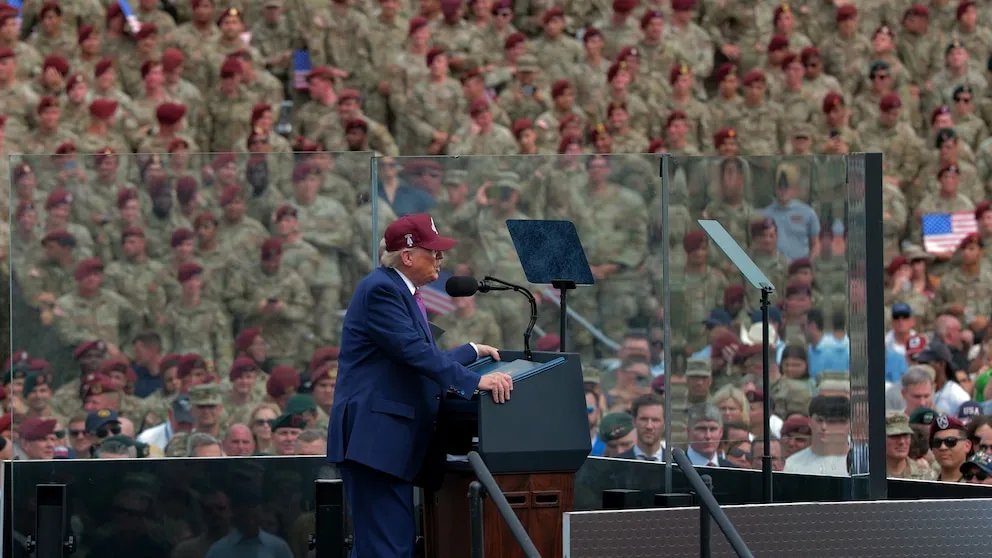Trump’s Bold Move: Restoring Confederate Names to Military Bases
In a significant and controversial announcement, former President Donald Trump has committed to restoring the names of military bases that honor Confederate leaders, a measure that reverses changes implemented during the Biden administration. This decision has sparked a fresh wave of debate across the nation regarding issues of history, race, and patriotism.
The Context of the Controversy
It was in June 2020, following nationwide protests against racial injustice, that the conversation around Confederate symbols took a pivotal turn. The military, following public outcry and broader societal shifts, initiated the renaming process for bases that bear the names of Confederate generals, including Fort Bragg, Fort Hood, and Fort Benning, among others.
Under Biden’s direction, the naming commission moved forward with a plan to rename these installations, which some argued represent a history of racial oppression, while others claimed that these changes erase important aspects of American history. Trump’s recent announcement to restore the old names has reinvigorated these contentious discussions.
The Trump Administration’s Rationale
During a press briefing, Trump outlined his vision for military bases under his potential new presidency, suggesting that the restoration of the names is a matter of ‘honoring our heritage.’ “These bases have names that reflect the greatness of our country, and changing them is just another step in the left’s relentless campaign to erase our history,” he stated.
This approach aligns with a broader strategy within the Republican Party, which positions the restoration of Confederate symbols as a defense of American identity. Trump’s base has historically held a strong affinity for traditional values, and this decision appears tailored to resonate with those constituents.
Public Reaction and Backlash
As expected, reactions to Trump’s announcement have been sharply divided. Supporters argue that restoring these names honors military history, whereas opponents believe it directly undermines the fight against systemic racism.
Many prominent figures, including military historians and civil rights advocates, have condemned the decision. “By restoring these names, Trump is giving validation to a narrative that glorifies a history of oppression,” said Dr. Sarah Johnson, a historian specializing in American civil rights. Critics fear that this move could incite challenges to military cohesion and morale, especially in an increasingly diverse armed forces.
The Military’s Neutral Stance
The Pentagon has remained relatively quiet in the face of this announcement, choosing to uphold a neutral stance as it navigates the intricate landscape of politics and military tradition. Military leaders, speaking anonymously, have indicated that the focus should remain on operational efficacy and cohesion rather than political declarations. Yet, some are expressing concern about the potential ramifications this could have within military ranks.
“We need to respect our veterans and their sacrifices, but we also need to ensure that all service members feel welcomed and valued,” stated one high-ranking official. This perspective highlights the balancing act that military leadership must perform in the contemporary social climate.
The Wider Implications for America
Trump’s announcement is not merely about names; it represents deeper cultural and political divisions within the United States. This move could be seen as an affirmation of a particular interpretation of American identity, one that emphasizes heritage at the potential expense of inclusivity.
In the years since the Black Lives Matter movement gained prominence, many American institutions have been reassessing their figures and symbols to reflect modern values. The restoration of Confederate names could signify a rejection of that reevaluation, further entrenching cultural battlegrounds across the nation. Political analysts warn that such decisions risk inflaming tensions just as the country approaches a crucial election year, potentially mobilizing opposition against pro-Trump sentiments.
Legal and Legislative Perspectives
With Trump’s announcement, many are questioning whether the restoration of these names would hold up against legal scrutiny. Congressional hearings on military naming conventions have already been scheduled, with lawmakers on both sides of the aisle preparing to grapple with the implications. Advocating for the renaming of military installations is seen as pivotal for many progressive lawmakers, thus prolonging the discussion surrounding military tradition vs. modern values.
Senator Elizabeth Warren expressed her dismay over Trump’s decision, stating, “We cannot allow our military to be an institution that venerates those who fought to maintain slavery. Respecting our military means evolving with our history.” Her comments encapsulate the frustrations echoed by many regarding the administration’s ownership of symbols tied to oppression.
Looking Ahead: The Future of Military Base Names
The future of military base names remains uncertain as the United States finds itself at a crossroads. While Trump’s announcement may have reignited support among specific voter demographics, it has also fueled opposition and activism from those advocating for racial justice and historical accuracy.
Various organizations are already mobilizing to contest this decision, launching campaigns aimed at preserving the movement towards a more inclusive narrative around U.S. military history. Furthermore, forthcoming elections will undoubtedly shape the landscape of this debate. As the nation watches, it remains crucial for Civil Rights organizations and military advocates to hold the line on what they define as American values moving forward.
Conclusion
Whether Trump’s restoration of Confederate names will have lasting implications on military culture and American identity is yet to be seen. The choice to honor figures like Robert E. Lee and others within the military context represents a potent symbol that runs deep in the fabric of American society. As the discussion carries forward, it signals the importance of historic reflection in shaping contemporary values and understanding. What role should historical symbols play in our society? How can we respect the past while ensuring a more inclusive future? These questions remain at the heart of this evolving narrative, and the answers will shape the next chapter in American history.







